Kraftwerk
run the show
The Sisters of Mercy, The Cure, Björk,
Ministry, Einstürzende Neubauten,
Front 242, Moby, Soft Cell, PJ Harvey,
Orbital... It has been unbelievable
each and every time, these stars have
been performing on the gravel pitch
that is the main stage area at the
Arvika Festival – in the forests
of Värmland – in the middle
of nowhere in Sweden.
Once underdog, the Arvika Festival,
has managed to attract most of their
dream artists, one by one, year after
year.
Now, the twelve year long career reaches
an all-time-high with the most significant
booking so far. It’s as big
as it gets for this very festival.
The organisers can hardly believe
it. I talked to the marketing manager
and one of the festival founders,
Fredrick Berntsson, immediately after
Kraftwerk was confirmed on May 25.
Fredrick is laughing, stuttering as
he tries to explain.
– I’ve been catching my
breath for five hours now and it feels
surreal. Now, we could stop doing
more festivals and live a normal life,
he jokes.
He and some other Arvika organisers
watched Kraftwerk when they played
three celebrated gigs in Stockholm
on February 8-10 last winter.
– It was so beautiful! Fredrick
remembers, although he admits Kraftwerk
isn’t your average festival
band. Mud, dust, beer and the rock’n’roll
lifestyle in full bloom just aren’t
their cup of tea, is it? But Arvika
is a rather clean festival, if there
is one, with excellent sound and light.
Kraftwerk as final entertainers on
the main outdoor stage on the very
last festival day might just be that
magical concert moment. Something
to tell the grand kids about one day.
– We think we got Kraftwerk
because they felt this festival could
be special to them. We made sure they
know what Arvika is about, Lars Johansson
says. He is in charge of international
bookings.
– I hope we can do something
cool for Kraftwerk when they come
here, Fredrick Berntsson says.
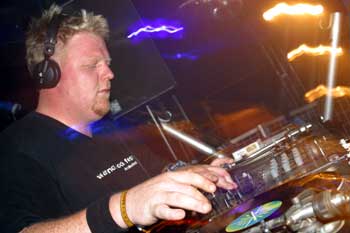
Fredrick
Berntsson is DJ Kvasi.
Ex-Kraftwerker
Karl Bartos was scheduled to perform
at Arvika with his successful hit
list of mostly Kraftwerk tunes (after
all, he has co-written most of the
Kraftwerk hits). It would have been
a bit strange with two Kraftwerk sets,
wouldn’t it? Shortly before
Arvika announced Kraftwerk, they said
Bartos was cancelled. I have not heard
a proper explanation yet.
For many of the Arvika visitors, Skinny
Puppy’s trip to Arvika this
year is a dream come true. Puppy haven’t
played on Scandinavian soil since
the eighties. Tours have been cancelled
on short notice. At one occasion,
I remember Release being asked by
the organisers to send out an advertisement
leaflet to the subscribers close to
the gig, which wasn't cancelled in
time for the leaflet to be stopped.
And Puppy side project Ohgr has cancelled
Arvika in the past. Arvika are somewhat
nervous now, but not afraid. They
stress Skinny Puppy are booked via
a big, solid promotor.
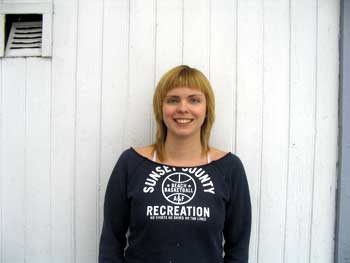
Anna
Mossberg.
Success
against the odds
Arvika has been labelled a goth, synth
and techno festival, and yes, you
can keep yourself busy within these
genres. But Arvika is so much more,
although most artists are alternative
or independent.
I know some readers wonder why Arvika
hasn’t focused solely on “dark
music”, like Wave Gotik Treffen,
Zillo or M’era Luna.
– We haven’t considered
it. It’s not interesting, because
then we wouldn’t have our special
mix of styles which is very important
to us, Lars Johanson says.
Festivals in Sweden come and go. Dalarock,
Raj Raj, Lollipop and a number of
small, local fests are gone. Anna
Mossberg, one of two festival presidents:
– For a couple of years, there
were too many festivals but we survived
those hard years. There’s still
too many though, and it will be interesting
to see this year play out.
Now, we all accept Arvika’s
success, popularity and growth as
something natural, but the future
of the festival was rather foggy in
the early days. Nothing was certain.
Why has Arvika succeeded?
– We have a solid ground and
a clear objective and profile, Anna
Mossberg thinks.
The Arvika headliners could with few
exceptions join other festivals like
Roskilde, Hultsfred and Quart –
and sometimes they do. But there,
these bands are more one of a kind.
At Arvika, they are stars and they
come in plenty. Arvika lines up an
extensive list of Release-styled bands,
from the tiniest demo acts to the
giant pioneers from the days of old.
The idea is to offer a complete, quite
well-balanced and enormous band package;
from small to big, from unknown to
well-known, local and international,
soft and hard and so on. And then
we have the genre balance, with synthpop,
EBM, trance, indiepop and so forth.
The mix is treated carefully and is
more or less the same from year to
year.
Arvika books a number of bands that
are considered quite far from “right”;
they do it with their heart and gut
feeling. They book those that other
organisers or media hardly look at.
And the festival crowd loves them
for this. It's a big crowd indeed.
As we know from our work with Release,
the artists ignored or ridiculed by
the mainstream aren’t necessarily
unpopular. Or ridiculous for that
matter.
– There are those who don’t
understand what we do here. People
in the music business are not too
excited about, for instance, synth,
Lars Johansson says.
Arvika has a healthy distance to the
music industries in Stockholm and
Oslo.
– We’re more or less outsiders.
And we’re perfectly fine with
that.
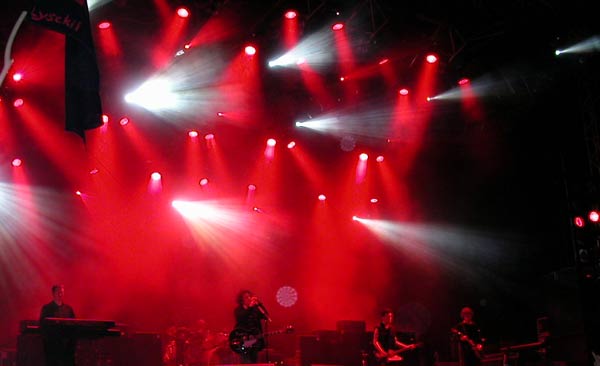
The
Cure at Arvika.
Photo by: MIkael Kahrle
The
art of booking
Most people say Arvika always delivers.
Some disagree. It doesn’t matter
if Arvika hires bands like Kraftwerk
and Skinny Puppy, people complain
about the program anyway. I know the
drill – I have organised a number
of gigs myself. People nag about certain
bands, but when you actually book
those particular bands, they care
less and start nagging about the bands
that don’t come. It's more obvious
with smaller bands.
Of course, Arvika listens to people’s
suggestions. But they also want to
bring in some more unknown interesting
artists people don’t know they
like yet, so to speak. Festivals like
Arvika can do just that. They can
take chances from time to time. People
will hopefully buy tickets anyway.
A smaller organiser of mini festivals
or concerts wants to make sure he
breaks even in advance and he can
achieve that by playing it safe.
It’s something of a problem
in Scandinavia these days though;
that most artists play shorter sets
at festivals or clubs (Arvika, SAMA,
Tinitus, Romo Night, Tech Noir and
so on), often without their full stage
shows. “It’s just a festival
gig”. The audience know that
maybe they’re not given the
real deal, or at least they are not
sure. Normal tours for normal venues
are almost rare for our kind of bands.
On the other hand, it’s more
of a risky business organising a standard
gig with just, say, Clan of Xymox
or Suicide Commando, than including
them in a big package.
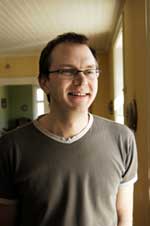
Lars
Johansson has worked with the Arvika
fest since the start, with different
area, stage, artist and
booking assignments. He has also worked
as area manager for the Pampas stage
at Hultsfred for three years.
Unique
shows
Lars cares more for artists that haven’t
been to Arvika before and those that
have a new release.
– And it’s all about booking
bands we feel excited about, that
sound great and can produce a good
show. Then all the bands should fit
together and we must break even.
Like most organisers, Arvika looks
for exclusiveness. They don’t
want their acts to appear elsewhere
before and after the festival. When
I ask Lars if they use their power
to block bands for other organisers,
he says that it’s not a problem.
One could think that it’s important
for bands to do Arvika and that in
respect for the festival’s non-profit
angle, they would be less costly than
otherwise.
– No, it’s rather the
opposite, Lars claims. They have to
go here for one single show.
Acts of lesser fame sometimes play
for very little though. It’s
obviously a great opportunity for
them to show themselves to the most
dedicated. The big names eat the majority
of the budget. One of Arvika’s
biggest headaches is not if
they want a certain band, but how
much they can afford.
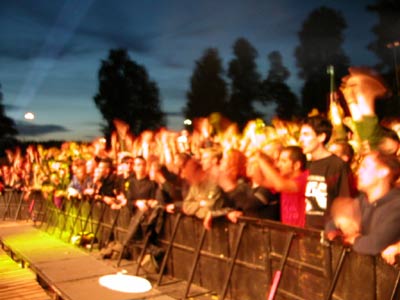
Photo
by: Mikael Kahrle
Non-profit money machine
The 30 persons in the festival management,
and 4-5 in in the active circle of
the booking team, suggest artists
and shape the program.
Lars Johansson and Fredrick Berntsson
are the only festival founders left
since the start.
– People come and go, Lars says.
Since no salaries are paid, other
priorities eventually take over in
most cases.
– Only my colleague Rasmus and
me are paid full-time and almost the
full year. Of course, we hire some
external professionals as well, but
the 1 700-2 000 workers are unpaid,
Anna Mossberg says.
The motivation is the love for music,
the fun and the wish to put their
own perfect festival together in Arvika.
The non-profit profile is the key
to most events like Arvika and this
is something that is difficult to
grasp for Americans, for instance.
The Arvika Festival is independent,
has no political agenda and works
with a number of sponsors and three
Swedish offices (EMA Telstar, Motor
and Luger) of US mega company Clear
Channel Entertainment.
The festival has the blessing of the
local authorities and the police,
which is of course fundamental. And
(the majority of) the local population.
– It was a bit tough to convince
all during the early years, but never
really hard. They trust us, Lars Johansson
says and he feels lucky.
Arvika has a long musical tradition
and a music school that educates music
teachers. The town only counts 14
000 inhabitants. The festival is visited
by 15 000 plus workforce, band etc.
Substantial changes this year
The
organisers have to take care of the
120 bands and their crews, but of
course not all of them acquire accommodation,
Lars Johansson tells me.
– Many of the big stars don’t
stay here the night after the gig.
There is an artist and press camping
close to the festival area (moved
this year), where I have camped myself,
alongside other individuals from the
dreaded press and smaller bands like
Alice in Videoland, Colony 5 and Post.
The main camping farther away from
the festival area is the focus of
many visitors’ criticism as
it gradually reduces normal decent
citizens to some kind of filthy festival
apes covered in mud. Prior to this
year's fest, rain has poured down
on and off for many days, so fear
is in the air...
– We’re trying to improve
the camping each year and we’re
looking at an additional camping area.
Then people can live less crowded,
Anna Mossberg, who has worked directly
with the camping before, says.
– Actually, we have always had
plans for moving the whole festival,
Lars laughs.
But now, they are busy with this year’s
radical changes, some of which are
realised just days before the festival.
The inner area is face-lifted, made
21% larger and the Pluto and Orion
stages are moved. There will be a
flea market and more places to sit.
Those with caravans can look forward
to an improved situation and a reserve
camping is built.
Under the new "festival in the
festival" flag, people can meet
the booking managers and others from
the crew, listen to demos handed over
to Arvika, look at photos, particpate
in contests and more.
Arvika is prepared for another twelve
years?
|
|
Excerpts
from Arvika's 2004 program
The majority can be found at On
Record,
Spotlight and/or News.
Arvika
web
page.
Alice in Videoland
Allied Vision
Auf der Maur
Broder Daniel
Daily Echo
Echo &
the Bunnymen
Ellen Allien
Eskobar
Faithless
Fixmer/McCarthy
Future Sound
of London: Amorphous Androgynous
In Strict
Confidence
Iris
Keane
Kraftwerk
Gabriel
Le Mar
Lustans Lakejer
Male or Female
My Dying Bride
Sara Noxx
Shiva Chandra
Skinny Puppy
Sophie Rimheden
Soundtrack
of our Lives
Space Tribe
Spektralized
Sturm Café
Sub 6
Sun Control
Spieces
This Fish Needs
a Bike
Universal Poplab
Weeping Willows
Wizzy Noise
Wolfsheim
Yahel |